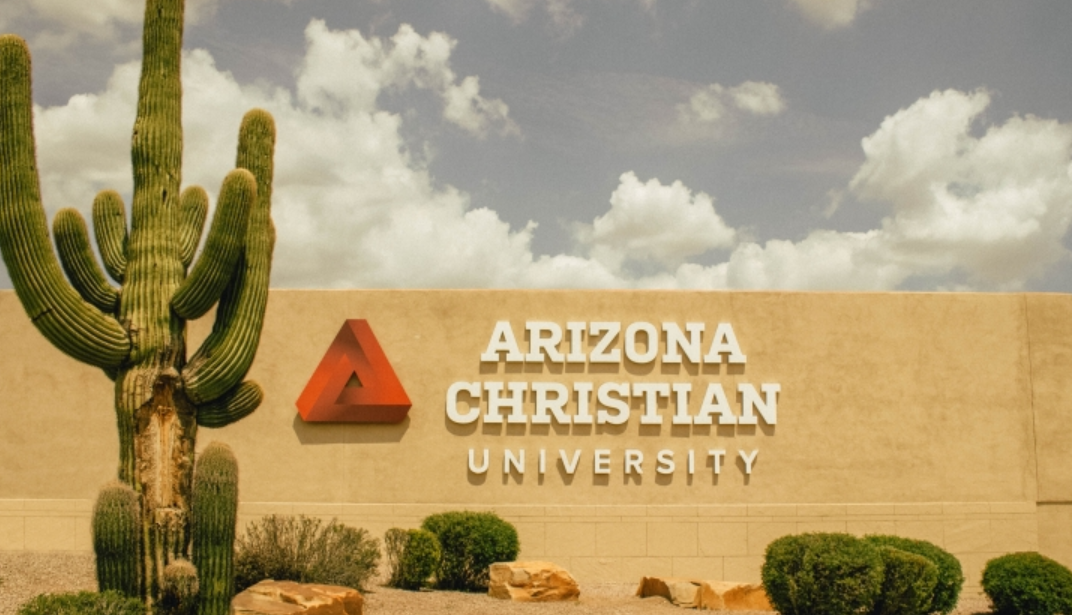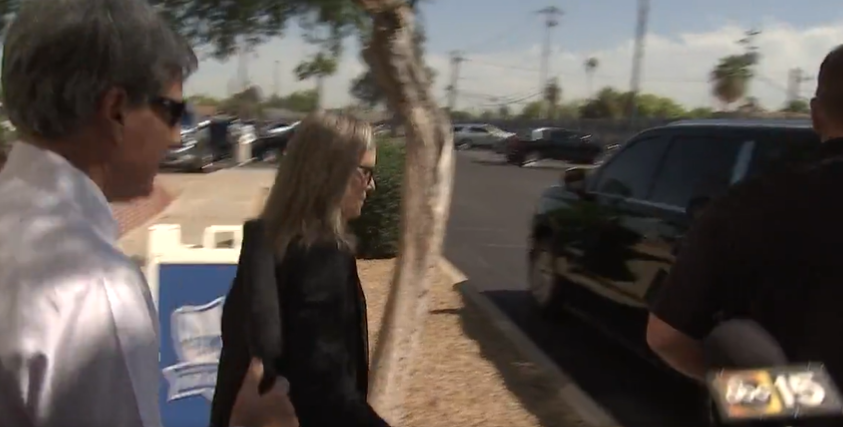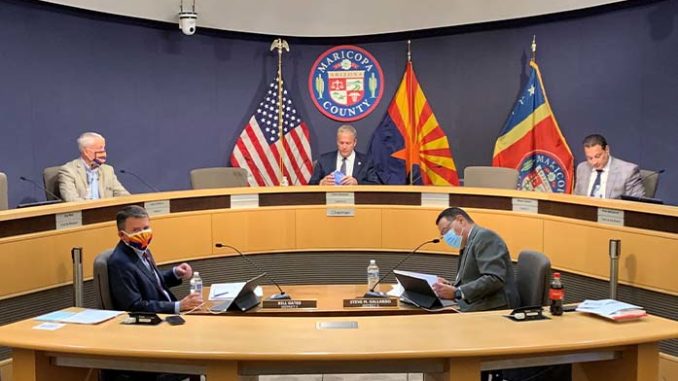
by Daniel Stefanski | May 7, 2023 | News
By Daniel Stefanski |
A recent announcement from the Environmental Protection Agency (EPA) to briefly lower costs at American gas pumps may hamstring Arizona’s largest county’s efforts to reduce its ozone footprint.
Last Friday, the EPA issued “an emergency fuel waiver to allow E15 gasoline – gasoline blended with 15% ethanol – to be sold during the summer driving season.” According to the EPA, “the waiver will help protect Americans from fuel supply crises by reducing our reliance on imported fossil fuels, building U.S. energy independence, and supporting American agriculture and manufacturing.” This action was made possible by The Clean Air Act, which “allows the EPA Administrator, in consultation with the Department of Energy, to temporarily waive certain fuel requirements to address shortages.”
The Biden Administration’s action on this front is not the first time they have attempted to reduce the cost of energy during the summer months. On April 29, 2022, the EPA also issued the waiver for E15 sales. The EPA’s most recent press release assured Americans the agency “does not expect any impact on air quality from this limited action (due to its own research),” and “consumers can continue to use E15 without concern that its use in the summer will impact air quality.”
This exploit from the federal government in 2022, however, sparked concerns about an increase in pollution for communities and states. In an interview with The Hill, Dan Becker director of the Safe Climate Transport Campaign at the Center for Biological Diversity, argued against the action because it “defeats everything that we’re trying to do to prevent more fuel from evaporating and getting into the air.” Margo Oge, the former Director of the EPA’s Office of Transportation and Air Quality, said (of the waiver), “The administration shouldn’t have done this, and they know they shouldn’t have done this, because this program to reduce evaporative emissions and keep the more volatile gasoline mixtures away from the summer months, has been in operation for decades.”
Becker also addressed the narrative of lower or neutral ozone impact from the waiver, referring to such rhetoric as a “long history of creative truth,” adding, “the amount of evaporation is not linear. In other words, E15 does not evaporate one and a half times as much as E10.”
Despite the EPA’s waiver that could lead to more ozone being released into the atmosphere, the agency continues to force local governments into extreme ozone-cutting measures. As AZ Free News reported last month, the Maricopa Association of Governments (MAG) recently contracted with a California-based consulting firm to “identify and evaluate new and available ozone precursor control measures that could be implemented within the nonattainment area” – which is an “eight-hour ozone boundary for the 2015 ozone standard (2015 National Ambient Air Quality Standard),” following a little-discussed published rule from the EPA in fall 2022, which moved “the region up the severity ladder for ozone pollution, reclassifying the region from ‘marginal’ to ‘moderate’ nonattainment for the ozone pollution standard.”
The consultant’s Final Report this spring suggested “approximately 50% reduction in nonattainment area anthropogenic NOx and VOC emissions” in order to bring the region into compliance with the EPA’s standard by an August 3, 2024, deadline.
To meet this deadline, suggested measures were included to reduce ozone in the Maricopa Nonattainment Area to meet Clean Air Act requirements related to the 2015 ozone standard. Some of the suggested measures include adopting standards similar to California like banning the internal combustion engine, banning gas appliances, and a host of regulations on various business activities.
The Republican-led Arizona Legislature has already moved to counter these potential measures, launching the Joint Legislative Ad Hoc Committee on Air Quality and Energy to “gather information from experts and the public about local recommendations on rulemaking determinations by the EPA on ozone nonattainment.” Representative Gail Griffin, the co-chair of the Committee, weighed in on the EPA’s announcement, telling AZ Free News, “E15 gasoline is known to increase ground-level smog, The EPA’s decision to allow E15 gasoline to be sold in Arizona is going to increase ozone levels in our state; then the EPA will turn around and penalize Arizona for the ozone. It’s counterproductive. Any increase in air pollution that results from the EPA’s decision shouldn’t count against us in our compliance with federal air quality requirements. It’s unfortunate to have a federal government that is constantly working against us.”
Senator Frank Carroll, a member of the Committee, told AZ Free News, “So, what exactly is the end game for the Biden EPA? Science indicates that this approach is not in the best interest of clean air, fuel economy, and bees. We can certainly hope to expect a reduction in the price at the pump. Keep in mind that it was Biden’s energy policy and his foreign policy that got us to the higher prices. With 2024 election campaigns off and running, the waiver of E15 sales by the EPA is a political calculation that assumes people have short term memories about why we’re at high gas prices and high grocery prices. I think it is time to end bad policies by voting out the bad policymakers.”
Carroll also shared his insights on the impact the E15 waiver would have on Arizonans:
- The EPA estimates that E15 is on average 25 cents a gallon cheaper than E10. Considering the economic times we are living in, will 25 cents a gallon stay in your pocket or evaporate at the grocery store? The price of tortillas and tamales increase when demand for ethanol increases.
- Ethanol fuel will damage engines. The design characteristics of internal combustion engines usually favor gasoline fuel or favor ethanol fuel. Ethanol shortens the shelf life of fuel, reacts with moisture causing particles and corrosion in fuel systems and engines, especially pre-2002.
- Even in engines that can operate on ethanol blends, there is a problem, energy density – a gallon of ethanol has only 2/3 the energy density of pure gasoline. You will notice a reduction in fuel economy.
- Some areas in Arizona are subject to Clean Air Act emission offset requirements. Adding ozone to the air only makes meeting the requirements less likely. (Check out April 24, 2023, Joint Legislature Ad Hoc Committee on Air Quality and Energy).
Another Republican member of the Committee, Representative Austin Smith, also opined on the Biden Administration’s desperate efforts to reduce gas prices, saying, “Addressing energy affordability and the rising cost of living in our country is paramount. But this is the wrong way to do it. We need to increase domestic energy production and lift federal regulations across all sectors, not just the areas that serve special interests. The Biden Administration is not paying attention to the needs of Arizonans.”
Daniel Stefanski is a reporter for AZ Free News. You can send him news tips using this link.

by Daniel Stefanski | May 6, 2023 | Education, News
By Daniel Stefanski |
A Christian university in Arizona scored a win for justice this week, ending a two-month legal battle with a local school district.
On Thursday, the Arizona-based Alliance Defending Freedom (ADF) announced a settlement between Arizona Christian University (ACU) and the Washington Elementary School District. The lawsuit, which was filed in the United States District Court for the District of Arizona, originated when the District “decided to terminate its (eleven-year) relationship with Arizona Christian and its students solely because of their religious status and beliefs on biblical marriage and sexuality.”
ACU President Len Munsil claimed victory with the settlement, saying, “This is a complete vindication of the rights of our students to be able to participate as student-teachers in a public school district without fear of religious discrimination. We obtained everything we wanted in this new agreement, without any sacrifice or compromise to our beliefs and our university’s religious purpose. We look forward to a continued beneficial partnership that serves ACU student-teachers and the students, faculty, and staff of the WESD. And we are so grateful for the team at Alliance Defending Freedom for their excellent advocacy for our religious freedoms.”
According to ADF, the “district’s board voted Wednesday night to enter a new agreement allowing ACU students to teach in the district once again” The district also paid $25,000 in attorneys’ fees. The motion to approve the settlement passed the Washington Elementary School District’s Governing Board 4-1. Members Jenni Abbott-Bayardi, Kyle Clayton, Lindsey M Peterson, and Nikkie Gomez-Whaley voted to approve, while Tamillia Valenzuela opposed this resolution.
ADF Senior Counsel and Vice President of U.S. Litigation David Cortman also weighed in on the settlement, stating, “By discriminating against Arizona Christian University and denying it an opportunity to participate in the student-teacher program because of its religious status and beliefs, the school district was in blatant violation of the U.S. Constitution, not to mention state law that protects ACU’s religious freedom. At a time when a critical shortage of qualified, caring teachers exists, the Washington Elementary School District board did the right thing by prioritizing the needs of elementary school children and agreeing to partner once again with ACU’s student-teachers.”
West Valley lawmaker Anthony Kern, who had been closely following this situation from the beginning, opined on the good news for ACU, tweeting, “Good news for the Constitution and religious freedom; bad news for “Cat Ears” and the rest of the Democrats on the Washington Elementary School Board. BTW – how much do the taxpayers have to pay??”
Daniel Stefanski is a reporter for AZ Free News. You can send him news tips using this link.

by Daniel Stefanski | May 5, 2023 | News
By Daniel Stefanski |
One of the least transparent administrations in Arizona history has become even less transparent.
On Tuesday, veteran Arizona reporter Dennis Welch shared a video he captured of Democrat Governor Katie Hobbs avoiding questions from reporters as she raced to an awaiting suburban. A Hobbs aide was overheard saying, “We’re not taking questions today; I’m very sorry.”
In sharing the video, Welch wrote, “The Hobbs Dodge: Footage from Governor Hobbs yesterday ducking questions from the press, again. The move has increasingly become standard operating procedure for a governor who promised an open relationship with the media at the start of her administration.”
The tweet has over half a million views.
Senate President Pro Tempore T.J. Shope told AZ Free News, “Governor Hobbs promised to run a transparent administration but from the beginning, it’s been clear that those were just talking points. From taking weeks to disclose donors to her inaugural events, vetoing bills without reaching out to members, and now running away from reporters, the only thing transparent has been her desire to walk herself off from the public.”
Representative Cory McGarr reacted to the video shortly after it hit the social media platform, tweeting, “If I couldn’t defend any of my insane actions as governor I would probably run from the press too.”
Representative Austin Smith tweeted, “Why would she need to talk to the media? Y’all carry water for her anyway. She’s not beholden to you. She owns you.”
Former Arizona legislator Vince Leach also weighed in, thanking Welch for sharing the video.
Members of the Arizona press also piled on to express their frustrations with Hobbs’ refusal to answer questions. Laurie Roberts, a columnist with the Arizona Republic, stated, “This is a bad look for a governor…”
Nick Phillips, a reporter with the Arizona Capitol Times, wrote, “Last time Governor Hobbs answered journalists’ questions was in March, before 2 high-profile departures from her comms team.”
Jeremy Duda, a reporter with Axios Phoenix, said, “This is an annual event and I don’t ever recall a governor not doing a gaggle with the press afterward. It wouldn’t be as much of an issue if Hobbs hadn’t halted the weekly press conferences she was doing during her first few months in office.”
After posting his video of Hobbs, Welch added, “It’s been 2 weeks since Governor Hobbs vetoed the so-called tamale bill. She still hasn’t said what changes she wants to get her support. Unlikely to get answers soon. Her schedule shows she’ll be in DC & Sedona (an off the record event) for the rest of the week.”
Daniel Stefanski is a reporter for AZ Free News. You can send him news tips using this link.

by Daniel Stefanski | May 4, 2023 | News
By Daniel Stefanski |
The animosity and distrust between the Maricopa Board of Supervisors and the Republican-led Arizona Legislature continues to deepen with a new issue finding a wedge between the two sides.
On Wednesday, Arizona Senator J.D. Mesnard took to the floor of his chamber to address the Maricopa County Supervisors’ ongoing consideration of two legislative vacancies in both the House and the Senate.
One of the vacancies is due to an expulsion of a Republican member of the Arizona House of Representatives. The other for a resignation of a Democrat member of the State Senate.
The Maricopa County Board of Supervisors is statutorily required by law to select the replacement for the vacancy from a pool of three same-party nominees chosen by their party. Republican precinct committeemen transmitted three names for the open House seat (Liz Harris, Julie Willoughby, and Steve Steele) as did the Democrats for the Senate seat (Representatives Cesar Aguilar and Flavio Bravio in addition to Quant’a Crews).
Mesnard’s frustrations boiled over on the Senate floor as he laid out his charge against the Supervisors’ alleged delay in filling the two vacancies for 19 (Senate) and 20 (House) days. He informed his colleagues “the length of these vacancies is the longest, while we’ve been in session, in a half a century – 56 years!” The East Valley lawmaker also said that 8.76 days is the historical average to fill the vacancy.
What seemed to bring Senator Mesnard to this point were some of the rumors he recounted hearing about for the reasons in the delay to fulfill the vacancies. According to the senator, “one of the rumors is there may be a belief that the county can reject all three of the nominees put forward.” The other rumor “is that (the supervisors) just want to sit on this for a while and hold out for some piece of legislation that they want to see passed” – in other words, “leverage” on the Arizona Legislature.
Senator Mesnard spoke on behalf of the 120 Republican precinct committeemen who rearranged their schedule back in April to nominate the three individuals to fill the open House seat. He bemoaned the fact that such a lengthy delay was not previously an issue, and he hinted that maybe his colleagues should take future action to change the statute to force the county board of supervisors to act with more urgency when filling vacancies during a legislative session. He stated that the “Board of Supervisors should have held a special meeting to hasten what should be an important priority for them.”
The members of the Maricopa County Board of Supervisors were definitely paying attention to Senator Mesnard’s words. Supervisor Steve Gallardo quickly responded on Twitter, writing, “Thanks for taking us all the way back to the 70s Senator. We didn’t receive nominees until the 4/18. Some didn’t respond right away to request for background info. Board is performing due diligence. As always, Arizona Senate Republicans are ignoring the facts.”
Daniel Stefanski is a reporter for AZ Free News. You can send him news tips using this link.

by Daniel Stefanski | May 3, 2023 | News
By Daniel Stefanksi |
As budget negotiations between Democrat Governor Katie Hobbs and the Republican leaders of the Arizona Legislature continue to inch closer toward a summer deadline, the Senate President and Speaker of the House are finding other endeavors to do the people’s business.
On Monday, the Arizona State Senate Republican Caucus announced an action taken by President Warren Petersen “to defend the Save Women’s Sports Act in court.”
That action was a Motion to Intervene in the case of Jane Doe, et al. v Thomas C. Horne, et al., which Petersen and Speaker Ben Toma filed in the United States District Court for the District of Arizona Tucson Division “to protect a state law banning biological males from competing in women’s and girls’ athletic events at Arizona public schools, colleges and universities.” The newly enacted policy was SB 1165, which was signed into law by former Arizona Governor Doug Ducey on March 30, 2022.
Petersen released the following quote to accompany the news of his court filing: “Senate and House Republicans stand in solidarity to protect women and girls from the injustices being attempted against them by the extreme left. Female athletes deserve equal opportunities in sporting events, which will not happen so long as males are allowed to compete against them. Science is clear that male athletes have many inherent physical advantages over females, including greater size, stronger muscles and larger bone structure. By allowing males to compete against females, we’re essentially subjecting young girls to greater risk of injury, as well as stripping them of athletic opportunities their female predecessors have long fought for. In the absence of the Attorney General defending Arizona’s law, we’re looking forward to fighting for the rights of female athletes across Arizona, as well as for the Court making it clear Arizona’s law protecting women and girls should be enforced.”
According to the Senate Republican’s press release, “on April 17, 2023, plaintiffs represented by a radical organization filed a motion for a preliminary injunction to stop the law from being enforced in Arizona,” and “Attorney General Kris Mayes is not defending the constitutionality of the law.”
The transfer of power from Republican Mark Brnovich to Democrat Kris Mayes in the Attorney General’s Office has forced the Republican-led Arizona Legislature into the lead role when it comes to litigation of federal and state lawsuits. Both legislative generals figure to take many more legal actions over the next year and a half with Democrats occupying the Governor’s and Attorney General’s Office in the Grand Canyon State.
Daniel Stefanski is a reporter for AZ Free News. You can send him news tips using this link.





